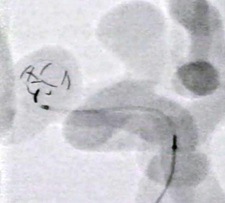
Arissa Medical has announced the successful evaluation of the Syntra intrasaccular scaffold system within simulated use conditions under fluoroscopy using clinically relevant, in-vitro intracranial aneurysm models provided by the Jacobs Institute in Buffalo, USA.
The Syntra INR user study evaluated the performance of the company’s Syntra device for the treatment of cerebral wide-necked sidewall aneurysms (WNSAs) and wide-necked bifurcation aneurysms (WNBAs). These irregular wide-necked, non-saccular aneurysms with acute angulations—defined as an unmet clinical need—were successfully treated at the Jacobs Institute by Syntra INR user study investigators Adnan Siddiqui and Elad Levy (both Jacobs Institute, Buffalo, USA).
The Syntra device is a novel intrasaccular scaffold endoskeleton implant designed to facilitate the treatment of irregular, wide-necked intracranial aneurysms that pose acute angulation challenges often found in sidewall and bifurcated aneurysms with acute takeoff angles in aneurysm morphology, according to an Arissa press release.
“Similar to coils alone, Syntra may have advantages for irregular aneurysms, allowing the user more freedom with respect to aneurysm shape and morphology,” study investigators from the Jacobs Institute explained.“Syntra may be of great use in ruptured aneurysms where stents are not an option. INRs [interventional neuroradiologists] are moving away from parent vessel implants requiring DAPT [dual antiplatelet therapy] as new intrasaccular devices enter this space.
“Syntra may provide utility where you don’t have a standard-shaped aneurysm with a wide neck and/or do not have true orthogonal bifurcation. Potential adjunctive use with less coils—therefore providing cost savings, reduced risks (e.g. less devices/risks, fluoroscopy, contrast media and overall procedural time), and greater security knowing that the aneurysm’s wide neck is protected—is a plus for the Syntra intrasaccular scaffold device.”
The Arissa release also states that, overall, results from this Jacobs Institute INR user study are “very promising” for the Syntra adjunctive intrasaccular therapy device in treating irregular, wide-neck intracranial aneurysms.












